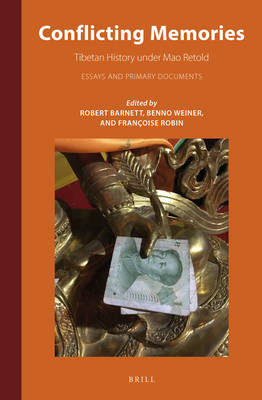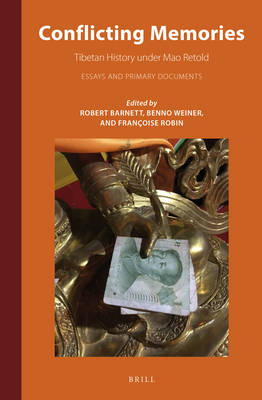
- Retrait gratuit dans votre magasin Club
- 7.000.000 titres dans notre catalogue
- Payer en toute sécurité
- Toujours un magasin près de chez vous
- Retrait gratuit dans votre magasin Club
- 7.000.0000 titres dans notre catalogue
- Payer en toute sécurité
- Toujours un magasin près de chez vous
Conflicting Memories
Tibetan History Under Mao Retold
297,95 €
+ 595 points
Description
Conflicting Memories is a study of how the Tibetan encounter with the Chinese state during the Maoist era has been recalled and reimagined by Chinese and Tibetan authors and artists since the late 1970s. Written by a team of historians, anthropologists, and scholars of religion, literature and culture, it examines official histories, biographies, memoirs, and films as well as oral testimonies, fiction, and writings by Buddhist adepts. The book includes translated extracts from key interviews, speeches, literature, and filmscripts. Conflicting Memories explores what these revised versions of the past chose as their focus, which types of people produced them, and what aims they pursued in the production of new, post-Mao descriptions of Tibet under Chinese socialism.
Contributors include: Robert Barnett, Benno Weiner, Françoise Robin, Bianca Horlemann, Alice Travers, Alex Raymond, Chung Tsering, Dáša Pejchar Mortensen, Charlene Makley, Xénia de Heering, Nicole Willock, M. Maria Turek, Geoffrey Barstow, Gedun Rabsal, Heather Stoddard, Organ Nyima.
"Conflicting Memories is a truly marvellous book. It has assembled critical readings of Tibetan memories of their fateful encounters with the Chinese Communists who came uninvited as their 'liberators' and 'friends'. Supplemented with excerpts from key Tibetan writings or oral reminiscences, the volume brings forth hitherto unheard of Tibetan voices. Yet, these were not hidden voices, but often commissioned by Chinese authorities or in dialogue with them, each trying to juggle the promissory pronouncements and an unsavoury reality. Taken together, the contrapuntal reading of these memories masterfully showcases Tibetan people's resourcefulness in dealing with a regime that often redefines its relations with Tibet while always aiming for total ownership." - URADYN E. BULAG, author of Collaborative Nationalism: The Politics of Friendship on China's Mongolian Frontier
"Conflicting Memories offers an invaluable collection aiding us to think through the complex and much contested ramifications of Tibet's incorporation into Maoist China. The mix of analytical articles by some of the best scholars now working in the area and original documents translated from the writings of astute Tibetan observers is particularly welcome. The volume will be required reading for all serious students of contemporary Tibet." - MATTHEW KAPSTEIN, author of The Tibetans
"This remarkable book offers unequalled access to the Tibetan experience of Communist nation-building. By examining how the Maoist encounter has been remembered and misremembered across many media--under the influence of ever-changing political conditions--the authors communicate both the trauma of those years and the persisting difficulty of coming to terms with it, for Chinese as well as Tibetans. The chapters, enhanced by numerous first-hand accounts and illustrations, represent the best scholarship of this field. Strongly recommended for readers interested in the history of the People's Republic and its ethnic minorities." - DONALD S. SUTTON, co-author of Contesting the Yellow Dragon: Ethnicity, Religion and the State in the Sino-Tibetan Borderland (with XIAOFEI KANG)
"This groundbreaking work sheds unprecedented light on the various processes of historical rewriting about Tibet since the death of Mao. The multivocal composition of the book offers rich and divers...
Contributors include: Robert Barnett, Benno Weiner, Françoise Robin, Bianca Horlemann, Alice Travers, Alex Raymond, Chung Tsering, Dáša Pejchar Mortensen, Charlene Makley, Xénia de Heering, Nicole Willock, M. Maria Turek, Geoffrey Barstow, Gedun Rabsal, Heather Stoddard, Organ Nyima.
"Conflicting Memories is a truly marvellous book. It has assembled critical readings of Tibetan memories of their fateful encounters with the Chinese Communists who came uninvited as their 'liberators' and 'friends'. Supplemented with excerpts from key Tibetan writings or oral reminiscences, the volume brings forth hitherto unheard of Tibetan voices. Yet, these were not hidden voices, but often commissioned by Chinese authorities or in dialogue with them, each trying to juggle the promissory pronouncements and an unsavoury reality. Taken together, the contrapuntal reading of these memories masterfully showcases Tibetan people's resourcefulness in dealing with a regime that often redefines its relations with Tibet while always aiming for total ownership." - URADYN E. BULAG, author of Collaborative Nationalism: The Politics of Friendship on China's Mongolian Frontier
"Conflicting Memories offers an invaluable collection aiding us to think through the complex and much contested ramifications of Tibet's incorporation into Maoist China. The mix of analytical articles by some of the best scholars now working in the area and original documents translated from the writings of astute Tibetan observers is particularly welcome. The volume will be required reading for all serious students of contemporary Tibet." - MATTHEW KAPSTEIN, author of The Tibetans
"This remarkable book offers unequalled access to the Tibetan experience of Communist nation-building. By examining how the Maoist encounter has been remembered and misremembered across many media--under the influence of ever-changing political conditions--the authors communicate both the trauma of those years and the persisting difficulty of coming to terms with it, for Chinese as well as Tibetans. The chapters, enhanced by numerous first-hand accounts and illustrations, represent the best scholarship of this field. Strongly recommended for readers interested in the history of the People's Republic and its ethnic minorities." - DONALD S. SUTTON, co-author of Contesting the Yellow Dragon: Ethnicity, Religion and the State in the Sino-Tibetan Borderland (with XIAOFEI KANG)
"This groundbreaking work sheds unprecedented light on the various processes of historical rewriting about Tibet since the death of Mao. The multivocal composition of the book offers rich and divers...
Spécifications
Parties prenantes
- Editeur:
Contenu
- Nombre de pages :
- 712
- Langue:
- Anglais
- Collection :
- Tome:
- n° 12
Caractéristiques
- EAN:
- 9789004433199
- Date de parution :
- 17-09-20
- Format:
- Livre relié
- Format numérique:
- Genaaid
- Dimensions :
- 155 mm x 236 mm
- Poids :
- 816 g

Les avis
Nous publions uniquement les avis qui respectent les conditions requises. Consultez nos conditions pour les avis.





